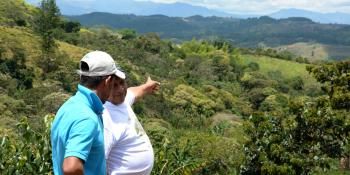Climate-smart agriculture as a means to combat drought and desertification

In celebration of the World Day to Combat Desertification and Drought, we look at how climate-smart agriculture promotes sustainable land management.
To promote public awareness and international efforts to combat desertification, the United Nations (UN) designated June 17 as the World Day to Combat Desertification and Drought. With the theme “Land has true value – Invest in it “, the focus of this year’s celebration is on sustainable land management as a way to improve economies, generate jobs, and revitalize communities.
Desertification, or simply the degradation of land in arid, semi-arid and dry sub-humid areas, remains a challenge to global food security. According to the UN Convention to Combat Desertification (UNCCD), desertification is a major threat to the livelihoods of more than 1 billion people in over 100 countries. The severity of land degradation worldwide has cost the global economy an estimated USD 490 billion per year.
Drought, considered one of the drivers of desertification, can lead to irreversible land degradation unless preventive measures are taken. UNCCD reported that each year 12 million hectares of arable land around the world are lost to drought. Furthermore, FAO reported that between 2005 and 2015, drought caused 30 percent of agricultural losses, amounting to over USD 29 billion.
In Southeast Asia, climate-induced drought remains a major problem in the agriculture sector. For instance, the recent 2015-2016 El Niño Southern Oscillation (ENSO) event caused extreme drought that had overwhelming impacts on various parts of the region. In the Philippines, agricultural losses across almost 557,000 hectares (ha) cost USD 325 million. In Vietnam, a total of 450,000 ha in the Central Highlands, South Central Coast, and Mekong River Delta were damaged.
Research in action
The CGIAR Research Program on Climate Change, Agriculture and Food Security (CCAFS) promotes the use of science and technology as an integral component of building climate-resilient agriculture. CCAFS has conducted research for development (R4D) to achieve agricultural productivity and sustainability while mitigating climate-related risks including drought and desertification.
In Southeast Asia in particular, CCAFS, together with the other CGIAR centers in Vietnam, conducted an assessment of the impacts of the 2015-2016 ENSO event. Through this intra-CGIAR collaboration, experts recommended measures that can be undertaken to cope with future recurrence of drought and ENSO in the Central Highlands, South Central Coast, and Mekong River Delta. The recommendations cover policies on diversification of agricultural systems; early warning and climate information services; cropping calendars and cropping intensities; water resources management; and stress-tolerant crop varieties.
Recently, CCAFS Southeast Asia, together with the CGIAR International Food Policy Research Institute (IFPRI), provided detailed analyses of institutions, mechanisms, and past and present actions to build resilience and provide emergency response to ENSO-related shocks in Cambodia, Laos, Myanmar, Philippines, and Vietnam. Recommendations were given on government initiatives, institutional capacity and policy responses, political economy of ENSO preparedness and response, interventions by the World Bank and development partners, and best practices for ENSO preparation and responses.
“Climate-smart” land management
CCAFS advocates for climate-smart agriculture (CSA) as a tool to address poverty and reduce climate-related impacts. CSA aims to enhance soil health in order to achieve productivity and at the same time adapt to and mitigate climate change. A variety of CSA technologies and practices have been developed to prevent erosion and nutrient loss, improve fertility and soil water availability, and to maximize soil’s potential as a carbon sink.
Through its Climate-Smart Villages (CSVs), CCAFS Southeast Asia promotes sustainable land management with farmers in Vietnam. In Ma CSV and nearby areas, a cassava-cowpea-forage grass intercropping system is being practiced to prevent soil erosion and land degradation. A CCAFS study found that the intercropping system improves soil fertility through biological nitrogen fixation and grass barriers. A second system, the acacia-based agroforestry system, was introduced to farmers in My Loi CSV. Acacia can effectively prevent soil erosion and improve moisture levels when integrated with other perennials and harvested selectively, rather than clear-cut with short-term rotations. Acacia is also a nitrogen-fixing species, which improves soil fertility.
To address water shortages during dry seasons in Laos, a rainwater harvesting practice is being developed in Phailom CSV. A model for a cost-effective rooftop rainwater harvesting system, which is ready for outscaling, was developed through this intervention. In addition, a new CSV was established in the dry zone of Myanmar. A CSA adaptation strategy (involving, e.g., crop diversification, dryland horticulture, and homestead gardening) will be developed there to improve climate resiliency, and at the same time address challenges around poverty, land degradation, and malnutrition.
As the project enters its next phase, CCAFS Southeast Asia will focus on scaling up and out CSA technologies and practices in its priority countries, to help farmers and communities cope with extreme weather events like drought. Better access to climate information services such as early warning systems, seasonal forecasts, and risk mapping will also be intensified to help farmers make informed decisions, manage risks, take advantage of favorable climate conditions, and adapt to climate change. Moreover, the development of climate index-based crop insurance will be further evaluated as a major risk mitigation strategy, especially for smallholder farmers in the region.
Read more:
- News update: Building ENSO-resilient agriculture in East Asia
- News update: A climate-smart way to improve soil fertility
- Research highlight: Severe drought and salinity intrusion in Vietnam assessed by research centers
Eisen Bernardo is the Senior Communication Specialist of CCAFS Southeast Asia.



